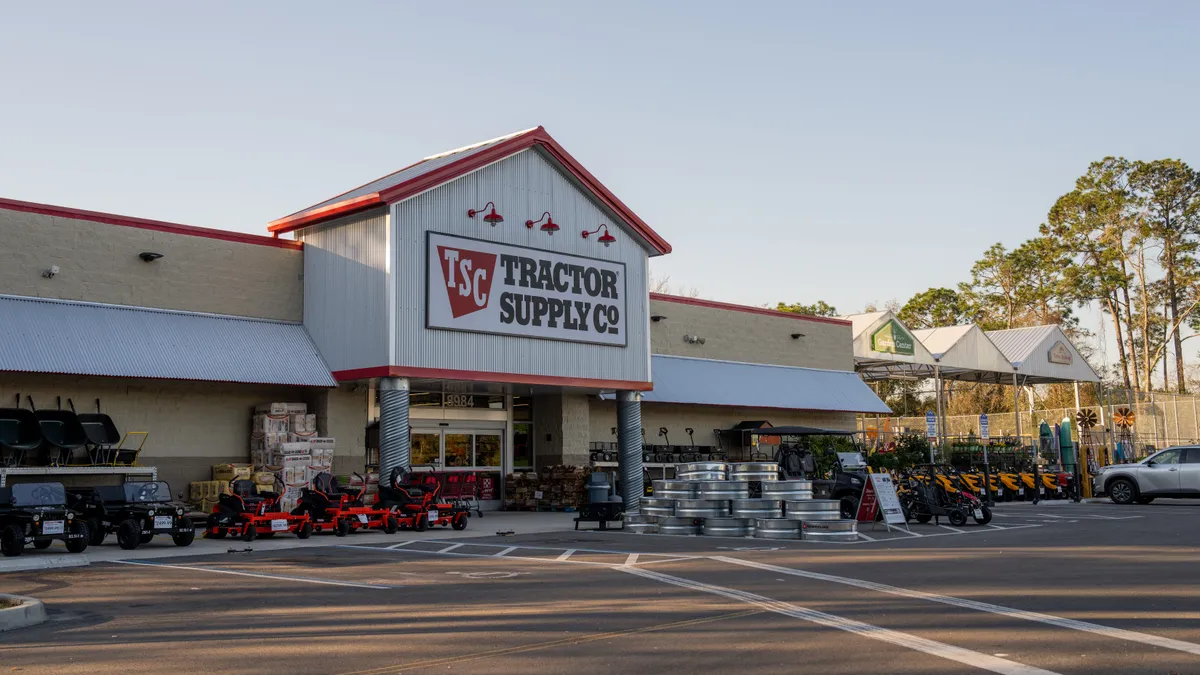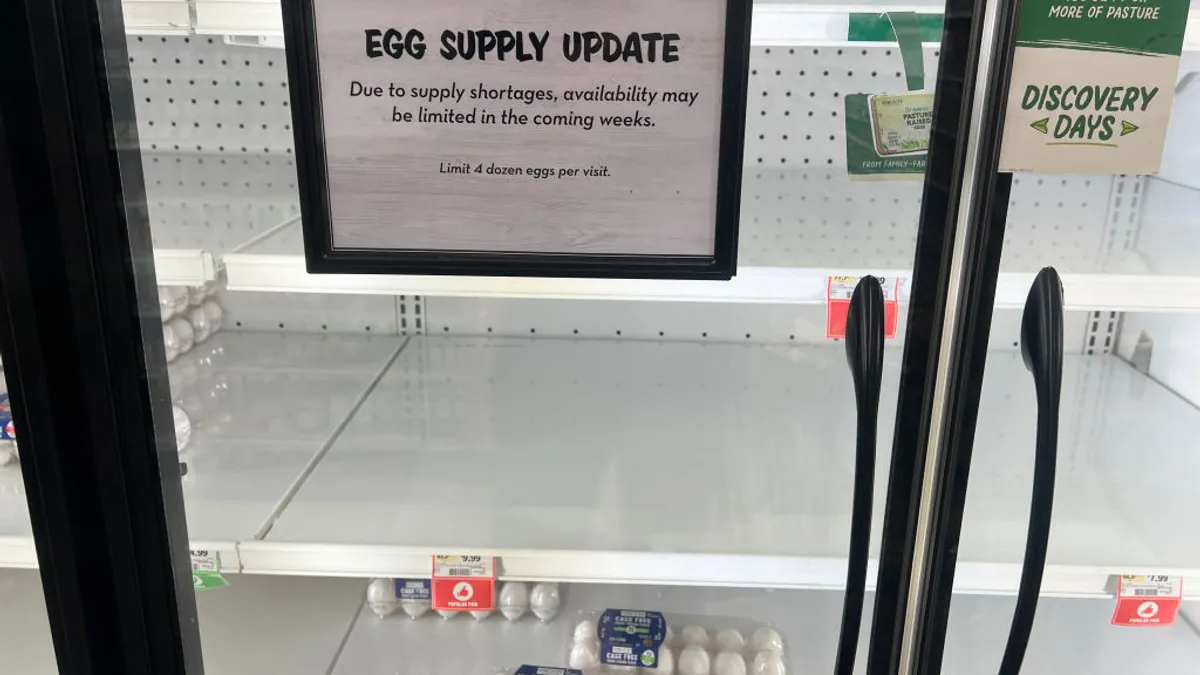Amid a three-week firestorm on social media against policies like diversity and climate initiatives, Tractor Supply issued a lengthy statement abandoning them. At the end of June, the retailer said it will eliminate all diversity, equity and inclusion roles, withdraw its carbon emissions goals and end support for Pride events and voting.
Now the retailer’s move has incited a backlash.
The company cited customer feedback for its action, though activist Robby Starbuck, who had stoked the online protest against Tractor Supply for “going woke,” has taken credit for the outcome. While Starbucks followers may have perceived Tractor Supply’s inclusivity and sustainability measures as problematic, other customers view its retraction that way.
Tractor Supply may hope that the fracas will subside. The retailer didn’t respond to multiple requests for comment for this article, and it has shut off comments on its social media accounts, where there’s been no update on the issue since the statement’s release. But here are four new problems it now confronts, according to several experts:
1. Tractor Supply abruptly retreated from longstanding values and goals.
The retailer hasn’t confirmed or denied that Starbucks campaign was the impetus for the significant changes to its corporate policies. But that is the impression it has left, suggesting that its retreat was not well thought out, experts say.
“Being bullied on social media is tough, and all firms need to have some contingency and emergency plans in place to deal with them,” Jo-Ellen Pozner, professor of management at Santa Clara University’s Leavey School of Business, said by email. “Engagement with activists can sometimes help, but my best advice is to think carefully about corporate values well in advance of any disruption and then use those values to guide decision-making. Capitulating to activists without reference to those values can be a dangerous move.”
Tractor Supply does appear to have thought through its policies. Until its most recent statement, executives were on the record touting years of work toward diversity and sustainability. In November, speaking to Morgan Stanley analyst Simeon Gutman, Tractor Supply Chief Financial Officer and Treasurer Kurt Barton described the retailer as “a purpose-driven company.” In 2021 the company reinforced and raised its environmental, social and governance goals, with a focus on diversity, equity and inclusion and environmental sustainability, after meeting targets set in 2018, he said.
"With the launch of the ESG strategy and all the work on DE and I and our team members, the things that we’ve done in the last two years I think are pretty phenomenal.”

Kurt Barton
Chief Financial Officer and Treasurer, Tractor Supply Company
In April, the company noted that it would work to reduce carbon emissions in line with the Science Based Targets Initiative, via its internal operations as well as its supply chain; it remains listed as “committed” at the SBTi dashboard.
“We are unapologetic with our investment in our people and the fact that our purpose in the stores or online is to be there to solve the problem and answer questions. We're a relationship business, not transactional,” Barton told Gutman. “Our team members aren't there just to load items on the shelf for a customer pickup. Our team members are there to engage. So it's our number one asset. And so with the launch of the ESG strategy and all the work on DE and I and our team members, the things that we've done in the last two years I think are pretty phenomenal.”
Barton is the executive who signed the version of the pullback statement filed with the Securities and Exchange Commission last month.
In order to minimize any sense that its DEI efforts were overly political, the company could have shifted these efforts or clarified its position, depending on how that would fit with its marketing and corporate aims, according to Alison Taylor, a professor at New York University’s Stern School of Business and author of “Higher Ground: How Business Can Do the Right Thing in a Turbulent World.” But walking away from longstanding policies based on a heated campaign just left them open to more criticism, she said by phone.
“The entire problem with anchoring to reputational risk is that you look completely directionless if you're shifting in the wind depending on who's yelling at you,” she said. “I can understand that companies are afraid of retaliation. I'm talking to a lot of them in the background about how they're altering their statements. But what Tractor Supply is doing wrong is looking reactive, like there's no internal compass whatsoever.”
2. Tractor Supply’s customer base is more diverse than it seems to realize.
In 2020, nearly a quarter of people living in rural America were people of color, and this population in the median rural county rose by 3.5 percentage points between 2010 and 2020, according to research from Brookings. That study also found that “rural counties in the South and West are particularly racially and ethnically diverse — with a substantial number of rural areas in these regions majority or near-majority people of color.”
The percentage of the rural population identifying as LGBTQ+ is similar to urban areas, according to a 2019 report from the Movement Advancement Project.
“Rural America is very diverse, whether it be racial ethnicities, sexual orientation, beliefs,” Ryan Goodman, an agriculture communications consultant who grew up on a cattle ranch in Virginia, said by phone. “It's not 100% Christian conservatives that live in and make up the network of rural communities out here. That's important. So how can we bring light to those that aren't always the most vocal as part of that or empower allies to help create that space where that diverse population can be included?”
“The entire problem with anchoring to reputational risk is that you look completely directionless if you’re shifting in the wind depending on who’s yelling at you."

Alison Taylor
Professor, New York University’s Stern School of Business
Goodman, whose first job outside the family ranch was at a Tractor Supply store, a few years ago also began advocating for the LGBTQ+ community within agriculture, despite some apprehension about being more visible.
“A retailer like Tractor Supply coming out and walking back on their work that they had done in DEI doesn't catch me off guard because I'm aware of the conversations that are happening in our rural communities. And unfortunately, I think a vocal minority had a big part,” he said. “But there are so many people in our rural communities who want to be allies to marginalized groups, but they don't always know how, or they're not always given a space where they're comfortable taking that next step.”
John Boyd, who says he has tried for years to work with Tractor Supply in supporting Black farmers, has grown impatient. Last week the group he leads, the National Black Farmers Association, called on CEO Hal Lawton to step down.
“They caved in to some blogger who tried to spin this about ‘woke’ or something. You know, I'm putting the plow in the ground the same as the next guy,” he said by phone. “What I'm trying to tell Tractor Supply is they need to send a signal out that they want Black farmers’ business too.”
As a marketing executive, Goodman says he finds younger people in rural communities to be generally more open-minded and view diversity, equity, inclusivity and sustainability goals positively. Two years ago, Lawton told analysts that the retailer’s “new customers continue to skew younger,” thanks in part to “a net migration out of urban areas, largely driven by millennials.”
The hobby farmers that Lawton says make up a major and growing segment of its customer base also tend to be younger and more diverse, according to Toni Farmer, a professor in the earth and environmental science departments at Rowan University and a hobby farmer herself.
“They caved in to some blogger who tried to spin this about ‘woke’ or something. You know, I’m putting the plow in the ground the same as the next guy."

John Boyd
President, National Black Farmers Association
“There are so many Black farmers, so many young people in all kinds of spectrums. They're renting land because they can't afford it. They are the future customers who are going to try and buy up small farms as the farmers age out,” she said by phone.
Indeed, research shows that the main reason that rural America is older and, in many places, less diverse is because many in older generations have held onto their land and housing even after retirement, according to Ben Winchester, a rural sociologist at the University of Minnesota Extension. Younger people and families move in as soon as housing becomes available, he said by video conference.
"We aren't the community from 50 years ago, and the community from 50 years ago is not the community from 100 years ago," Winchester said. "We are constantly shifting and changing. Overall, rural is durable, desirable and more diverse economically, socially and demographically than ever before."
3. Tractor Supply may need to work harder to appeal to customers who have alternatives.
Past controversies offer conflicting clues into how many customers or investors Tractor Supply could lose, if any.
There is some evidence that Tesla CEO Elon Musk’s statements and behavior are hurting sales at least to some extent, according to a recent survey by The New York Times. But, by and large, boycotts don’t stick over the long run, experts say.
While last year’s social media-fueled boycott against Bud Light’s work with transgender influencer Dylan Mulvaney was widely seen as effective, the beer had already suffered low-satisfaction scores beforehand, according to Vikas Mittal, professor of marketing at Rice University’s Jones Graduate School of Business.
“When your product or service is mediocre, which was the case for Bud Light, then you can see an exodus of customers, because customers really are not valuing your product or service in terms of their customer satisfaction, but they're basically putting more primacy into all of these other factors,” he said by phone.
By contrast, six years ago Nike scored with customers by diving into the controversy surrounding Colin Kaepernick, tapping him to lead an iteration of its “Just Do It” campaign, because its brand is so strong, he said.
“Demographic shifts in Tractor Supply's customer base are likely going to be consequential to what happens next. We will see whether this company really caters to folks with conservative values, like the activists we saw at work last month, or whether its recent performance is based on an expanding and more expansive consumer base.”

Jo-Ellen Pozner
Professor of Management, Santa Clara University’s Leavey School of Business
As a retailer and not just a brand, Tractor Supply also faces the challenge of wooing back any disappointed customers who may be able to obtain the same goods elsewhere. That means every aspect of operations, from parking lots to customer service, must be stellar, according to Mittal.
“Make sure that the value proposition is top notch, and that they do a really good job full time. So for example, if people go there for whatever products, don't have any stock outs. Stores are very clean,” he said. “All the things that create value for the customer, make sure you're really distinguished or differentiated on that, and then this will go away.”
Because most consumers are creatures of habit, that could be true, especially for anyone who would have to travel some distance for an alternative, according to Pozner.
“Demographic shifts in Tractor Supply's customer base are likely going to be consequential to what happens next,” she said. “We will see whether this company really caters to folks with conservative values, like the activists we saw at work last month, or whether its recent performance is based on an expanding and more expansive consumer base.”
4. Tractor Supply now faces uncertainty.
The recent attention on Tractor Supply has introduced some unknowns, according to UBS analysts led by Michael Lasser.
“While we believe that Tractor took its steps in reaction to what it heard from its customers, it's unclear what the impact has been since then,” Lasser said in a client note. “While it remains to be seen whether there is a long-term impact on the business, the near-term focus would argue that the customer reaction and internal employee response will be important.”
The retailer’s shifts in merchandising — adding more toys, apparel, gardening supplies and pet supplies — and where their stores are increasingly located show that it’s pursuing market share beyond traditional, larger-scale farming, according to Farmer. New stores helped drive Tractor Supply Co.’s Q1 net sales up 3% to $3.39 billion, and the company has plans to open another 80 new locations plus 10 to 15 new Petsense stores this year.
“I see them starting to put Tractor Supply stores in areas you wouldn't necessarily associate entirely with farming, which tells me they're recognizing, ‘Oh, we've got a big market out here that we haven't tapped,’” Farmer said. “So if they're trying to expand into that, and that was their goal, to lean into this hobby farmer, then they made a huge miscalculation.”
The sudden shift in policy is likely confusing to employees, customers and investors, especially for those who may have benefitted from or were attracted to the company’s previous policies, according to Pozner.
"While it remains to be seen whether there is a long-term impact on the business, the near-term focus would argue that the customer reaction and internal employee response will be important.”

Michael Lasser
Analyst, UBS Global Research and Evidence Lab
“Abrupt change is difficult and destabilizing, and unless plans were communicated clearly, consistently, and coherently to internal audiences, the firm might see a drop in motivation and engagement, increased absenteeism and turnover, and a loss of talent,” she said. “That's not only bad for Tractor Supply as a company, it is awful for those employees who might be disheartened by the move and abysmal for customers who observe and suffer because of the fallout.”
In addition, the company’s board and C-suite are likely still grappling with its unintended entry into the culture wars, and there may be “significant changes at the top within the next 18 months,” she also said.
Tractor Supply’s share price is up significantly from January, but has continued to slide since it released its statement, reaching a one-month low at press time.




















